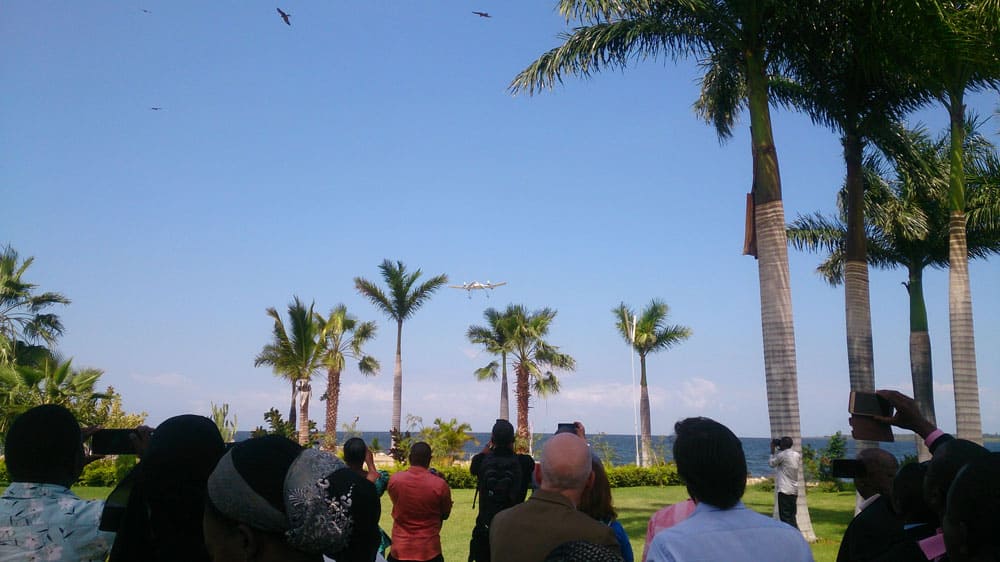Piloting the Use of Unmanned Aerial Vehicles to Deliver Health Products in Tanzania
May 7th, 2018 |
In Tanzania, the delivery of lifesaving health supplies—from the Medical Stores Department (MSD) in Mwanza, where the products are stored, to patients at Ukerewe District Hospital on Ukerewe Island—is a challenge. Transporting health products, blood supplies, and emergency medicines to health facilities on the island takes an entire day, with travel by truck, ferryboat, and then another truck. The same challenge is faced when sending laboratory samples from Ukerewe for testing in Mwanza. Once MSD staff arrive on Ukerewe and make their delivery, they are at the mercy of the ferry schedule when trying to make it back to Mwanza on the same day. Costly and lengthy transportation and other infrastructure challenges lead to stockouts and make it difficult to keep health products on the shelves and in the refrigerators of the facilities. As such, treatable health conditions become life-threatening emergencies.
Through Deliver the Future, Deutsche Gesellschaft für Internationale Zusammenarbeit (GIZ); Wingcopter, a UAV manufacturer; and the Tanzanian government collaborated to explore how they could use UAVs to reach far-off locations. JSI’s Bill & Melinda Gates Foundation-funded inSupply project partnered with the Deliver the Future team to provide supply chain expertise to the project, including advising on which health products were most suited for UAV delivery, how to connect this delivery with the broader supply chain, and support in forging connections with governmental and non-governmental stakeholders.
One of the important first steps of this project was selecting the right product for transportation via UAV. inSupply recently published a white paper analyzing the cost-effectiveness of various product categories for delivery by UAV. We used this to help the Deliver the Future team to select products for distribution. Consequently, the pilot flights will deliver essential medicines, vaccines, blood supplies, and diagnostic samples to start, while testing the overall feasibility of the approach.
There are various UAV vehicles currently available—their flight range varies; they can carry different cargo weights; and they feature different methods of flying and design, such as fixed-wing, multi-copter, and hybrid with vertical take-off and landing capability or launched into the air. Wingcopter’s key design features allow it to take off and land vertically, operate without launching stations, and hover in place and take forward flight. These specific features will let health workers both receive health commodity deliveries in Ukerewe and send laboratory samples back to the mainland for testing. By transporting products and samples in both flight directions, Wingcopter UAVs will make more efficient use of flight time and resources.
UAVs are a new innovation in many countries and partnership and coordination with regulatory and other government agencies has been critical to safe and legal operations. Leveraging years of experience of working with the Tanzanian government, JSI and inSupply helped the Deliver the Future team navigate government agencies and procedures. The Tanzania Civil Aviation Authority, Tanzania Communications Regulatory Authority, and the Ministry of Defense have all given their approval for flights to begin.

Over the past few months, Wingcopter has recruited local operators to remotely pilot the UAVs. After numerous training sessions and flights in controlled settings, the operators have taken to the sky with delivery test flights to Ukerewe District Hospital. Project teams, consisting of flight operations and health staff, have identified takeoff and landing sites at the Bugando Medical Centre, Ukerewe District Hospital, and the MSD zonal stores where they will be based. Flight operators are not the only team members working to implement this new distribution approach. Health facility staff at all locations will assist in preparing and receiving deliveries from the UAVs and are crucial to the project’s success.
In the early stages of any new technology or approach, evaluation is crucial to find out what works, what can be improved, and to consider questions such as scale. Depending on the outcomes of the analysis, the plans are to use this initial test case in Mwanza to inform a broader rollout to other zones in Tanzania. The project team will conduct both cost-effectiveness and cost-benefit analyses, using inSupply’s analytic tool and approach. This will also contribute toward the larger body of research and analysis already underway to find out what conditions and use cases work best for UAV delivery.
JSI is also working with the Tanzanian government and the World Bank on additional UAV activities in Mwanza through the Lake Victoria Challenge. The event will include a technology challenge component focused on local uses.
Written by Matiko Machagge and Sam Schmader
We strive to build lasting relationships to produce better health outcomes for all.